Pattern language
-
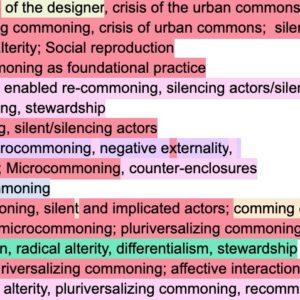
Commoning design and designing commons
Botero, A., Marttila, S., Poderi, G., Saad-Sulonen, J., Seravalli, A., Teli, M., & van Amstel, F.M.C. (2020, June). Commoning Design and Designing Commons. In Proceedings of the 16th Participatory Design Conference 2020-Participation (s) Otherwise-Volume 2 (pp. 178-180). DOI: https://doi.org/10.1145/3384772.3385162 - Jun 24, 2020 -
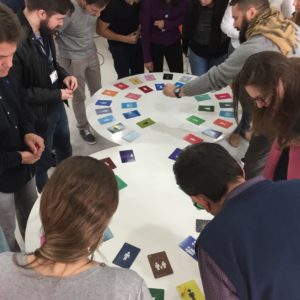 Design patterns deconstructs the myth that design projects are created by a single consciousness, the lonely designer. Every project, be that developed by a single designer or by a design team, reproduces common patterns that society at large cultivates. Card decks collect and organize design patterns with common problems and solutions in a certain design […] - Nov 22, 2018
Design patterns deconstructs the myth that design projects are created by a single consciousness, the lonely designer. Every project, be that developed by a single designer or by a design team, reproduces common patterns that society at large cultivates. Card decks collect and organize design patterns with common problems and solutions in a certain design […] - Nov 22, 2018 -
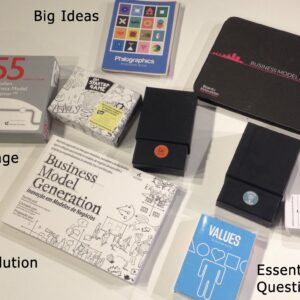
Pattern-based collaborative design with cards deck
Abstract: At PUCPR’s Academy we offer students a handful of special card decks to help them learn about the possibilities for design. There is a deck on business models, another on user interface, a third on human values, and the collection is always growing. In this hands-on session, we will demonstrate how we let students […] - Nov 22, 2018 -
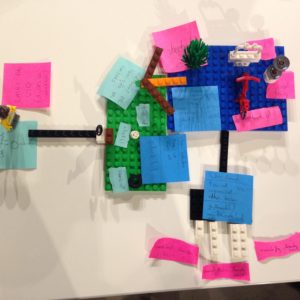 Unified Modeling Language (UML) is a set of standard diagrams and notations for creating software. We created at PUPCR a physical version of these diagrams with Lego to enable the participation of designers, clients, and users in software architecture and modeling activities. The concrete representations help the participants understand and make good use of software […] - Nov 1, 2018
Unified Modeling Language (UML) is a set of standard diagrams and notations for creating software. We created at PUPCR a physical version of these diagrams with Lego to enable the participation of designers, clients, and users in software architecture and modeling activities. The concrete representations help the participants understand and make good use of software […] - Nov 1, 2018 -
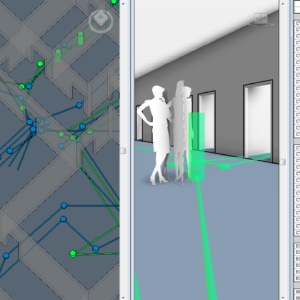
Walking paths parametric design tool (2012)
Walking Paths is an extension for Autodesk Revit, an industry standard tool for architectural design. The extension allows tracing the paths that patients, nurses, and other users should follow inside a facility. The application provides objective criteria to evaluate the work efficiency of a particular facility design. Walking_Paths [RFA] An Autodesk Revit parametric design family […] - Dec 13, 2012 -
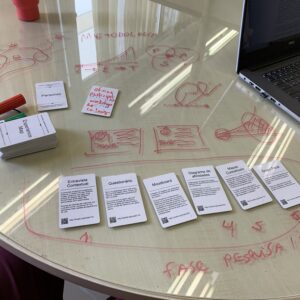 A card deck for collaborative planning user experience projects. Each card is a UX method, with the necessary inputs and the expected outputs. The cards can be organized in a linear fashion to represent the planned process. There are also cards for representing risks, expected delays, and extra human/financial resources. UX Cards enables pattern-based codesign […] - Nov 24, 2011
A card deck for collaborative planning user experience projects. Each card is a UX method, with the necessary inputs and the expected outputs. The cards can be organized in a linear fashion to represent the planned process. There are also cards for representing risks, expected delays, and extra human/financial resources. UX Cards enables pattern-based codesign […] - Nov 24, 2011 -
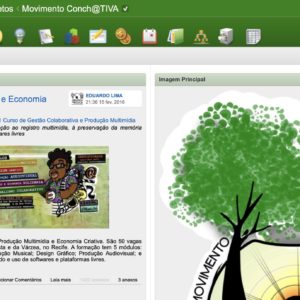 Corais was launched in 2011 as the open innovation platform of Faber-Ludens Interaction Design Institute. Since 2012, it became an independent cooperative platform for cultural producers in Brazil, maintained by Instituto Ambiente em Movimento and developed by Frederick van Amstel as an outreach activity of his academic work. An open design platform Development forked from […] - Nov 14, 2011
Corais was launched in 2011 as the open innovation platform of Faber-Ludens Interaction Design Institute. Since 2012, it became an independent cooperative platform for cultural producers in Brazil, maintained by Instituto Ambiente em Movimento and developed by Frederick van Amstel as an outreach activity of his academic work. An open design platform Development forked from […] - Nov 14, 2011